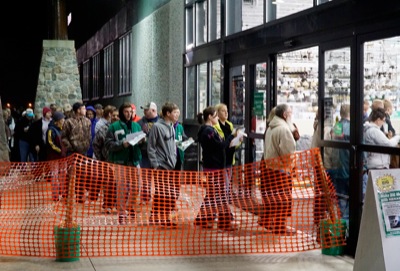Friday, November 25th, 2016
Area farm to try manure technology
Commissioners OK $9,850 for pilot test
By William Kincaid
CELINA - Mercer County commissioners this week authorized a $9,850 pilot test of equipment designed to remove phosphorous from manure.
The pilot test on swine manure will take place the week of Dec. 5 at Brad Schwieterman's farm on Clover Four Road in Franklin Township, Ag Solutions Coordinator Theresa Dirksen told the newspaper. The project will assess the efficiency and potential operating costs of Digested Organics' Nutrient Concentration System.
Depending on the test results, the Ann Arbor, Michigan, company's ultrafiltration equipment may be recommended for local use to help reduce nutrient runoff blamed for toxic algal blooms in Grand Lake.
"I think (it could be) part of the solution," Dirksen said. "Swine manure has historically been a bigger issue in our area than dairy."
Earlier this month, Chris Maloney of Digested Organics said the company's first permanent commercial system went online this spring in Sheboygan Falls, Wisconsin, at a 2,500-head dairy operation. It cost about $1.3 million and has six components. He had said a complete, portable system for a 100-head dairy, a more typical size for Mercer and Auglaize counties, would cost about $375,000.
Dirksen, who was hired in March by the commissioners to search for affordable manure-management methods, said farmers she had contacted were interested in two parts of the system - the manure solid/liquid separation component, which uses a screw press, and the ultrafiltration component, which concentrates 95 percent of the phosphorous from the raw manure into a nutrient-rich fertilizer.
The pilot test of the ultrafiltration component will benefit both the area and Digested Organics. The company has found success with removing phosphorous - which studies have shown is the main nutrient feeding toxic algal blooms in Grand Lake - from dairy manure but doesn't have as much experience with swine manure, Dirksen said.
"Performance information collected during this demonstration will allow us to size and price commercial-scale equipment, as well as determine operating costs, to give farmers and regulatory agencies in Mercer County a sense of how much this technology costs to implement on various size farms," a company proposal states.
The biggest operating costs will be electricity and the heating fuel of propane or natural gas, Dirksen said. No chemicals are used in the process.
For $9,850, Digested Organics will transport and set up ultrafiltration equipment at the farm, collect data for at least three days, clean up the site and remove the equipment and coordinate with a local lab for testing and filing a complete summary report.
Company officials said the equipment will separate raw manure into permeate and concentrate. Permeate contains no suspended solids, organisms or pathogens and typically contains less than 0.25 pounds of total phosphorus per 1,000 gallons.
The concentrate, the proposal states, will be a thicker product containing all the suspended solids and 95 percent or more of the phosphorous.
"Approximately 100 gallons of raw manure can be processed per day, generating about 90 gallons of permeate and 10 gallons of concentrate," the proposal states. "The raw manure, permeate and concentrate will be analyzed by a local lab to determine the dry matter and nutrient content."
Mercer County will pay for the test pilot with conveyance fee funds used by the county economic development office for daily operation and to promote and support business expansion.
The county collects a real estate conveyance/transfer fee of $1 per $1,000 of property value to support its community development office and strengthen the local workforce. As of the end of October, the conveyance account had a balance of $100,580.
Any specific funding request not for daily operations or does not have new jobs connected to it must be approved by commissioners.
"Agriculture is Mercer County's No. 1 industry; it is vital to explore ways to maintain this level in the agricultural segment and be good stewards of our land," the resolution states. "The pilot project will provide solid data on the feasibility of the use of the technology with swine manure, a better idea of the operating costs associated with the technology and will ultimately provide the much needed insight and data to those farmers in need of a solution to reduce phosphorous loading on their farms; it is a step towards the ultimate goal of reducing phosphorous in the Grand Lake St. Marys Watershed."



